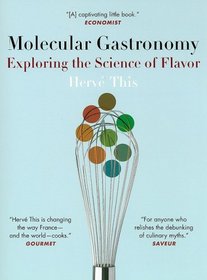Search -
Molecular Gastronomy: Exploring the Science of Flavor (Arts and Traditions of the Table: Perspectives on Culinary History)
Molecular Gastronomy Exploring the Science of Flavor - Arts and Traditions of the Table: Perspectives on Culinary History
Author:
Hervé This (pronounced "Teess") is an internationally renowned chemist, a popular French television personality, a bestselling cookbook author, a longtime collaborator with the famed French chef Pierre Gagnaire, and the only person to hold a doctorate in molecular gastronomy, a cutting-edge field he pioneered. Bringing the instruments and experi... more »
Author:
Hervé This (pronounced "Teess") is an internationally renowned chemist, a popular French television personality, a bestselling cookbook author, a longtime collaborator with the famed French chef Pierre Gagnaire, and the only person to hold a doctorate in molecular gastronomy, a cutting-edge field he pioneered. Bringing the instruments and experi... more »
ISBN-13: 9780231133135
ISBN-10: 0231133138
Publication Date: 7/11/2008
Pages: 392
Rating: ?
ISBN-10: 0231133138
Publication Date: 7/11/2008
Pages: 392
Rating: ?
0 stars, based on 0 rating
Publisher: Columbia University Press
Book Type: Paperback
Other Versions: Hardcover
Members Wishing: 5
Reviews: Amazon | Write a Review
Book Type: Paperback
Other Versions: Hardcover
Members Wishing: 5
Reviews: Amazon | Write a Review
Genres:
- Cookbooks, Food & Wine >> Cooking Education & Reference >> Essays
- Cookbooks, Food & Wine >> Cooking Methods
- Cookbooks, Food & Wine >> Kitchen Appliances
- Cookbooks, Food & Wine >> Celebrities & TV Shows
- Science & Math >> Chemistry >> General & Reference
- Science & Math >> Physics
- Science & Math >> Agricultural Sciences >> Food Science




